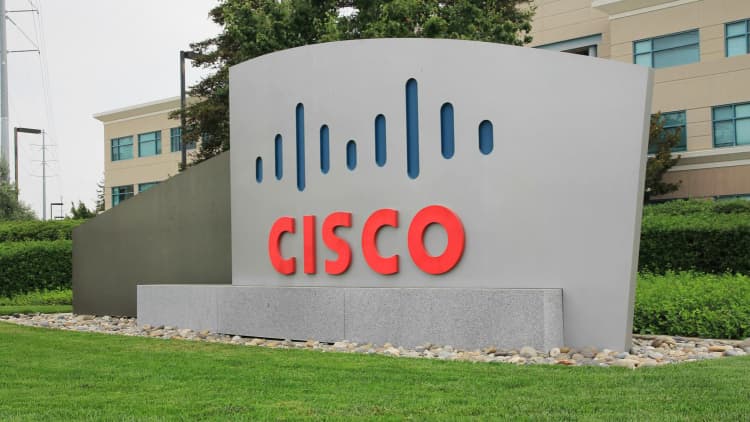Cisco turned in a solid report: beats on revenue ($12.4 billion vs. $12.14 billion expected) and earnings (55 cents vs. 53 cents). Revenue guidance was solid, though EPS was a little light. Gross margins held up.
So why the angst?
Beyond the headline numbers Wednesday, there was plenty of signs of turbulence. Cisco's sales in emerging markets were down, and CEO John Chambers said they won't return to growth for several quarters. And there are the layoffs: 6,000 more coming soon, wiping out 8 percent of Cisco's already reduced workforce.
The layoffs weren't exactly shocking. Chambers had signaled earlier in the year that he would protect Cisco's profitability in these uncertain times, which clearly implied he would cut more workers if sales growth didn't materialize. With this report's dismal outlook on emerging markets growth, the cuts were almost a foregone conclusion. The stock dropped more than 2 percent after the open Thursday. (Click here for the latest price.)
A deeper question, though, is what this tells us about Cisco.

It may be hard to remember now, but two decades ago, Cisco was the equivalent of what Google is today: a Silicon Valley giant on a seemingly endless march to power. Its rise echoed the rise of the Internet. If you believed in digital anything, e-commerce or information superhighways, you believed in Cisco.
The company had a voracious appetite, gobbling up companies that its customers praised. Chambers declared the company a master of the "market transition." He argued that Cisco could see earth-shattering changes before they hit, and reposition itself in time to benefit.
Over the past five years, though, that story has gotten harder to believe.
Read MoreCisco pained by China protectionism
There was Chambers' ill-conceived push into home videoconferencing, which was expensive and ignored the smartphone revolution. His enterprise videoconferencing move had similar issues. Meanwhile the company entered the consumer market with the purchase of Pure Digital and its Flipcam. But it utterly failed to invest in the business and turn it into the next Nest or Dropcam or GoPro, instead shuttering the whole thing and abandoning the consumer push. There were market transitions, and Chambers saw them coming, but in some key instances he just fumbled Cisco's responses.
That wasn't true in every case, of course. Chambers' move into servers has been an unqualified success, though many doubted whether its pricey hardware would find a place in the market. And he has managed to extend Cisco's networking business into wireless in a healthy way.
Read MorePros see potential opportunity in Cisco
What Chambers hasn't yet done is articulate a bold vision for the company that seeks a new area of growth — the equivalent of Oracle's hardware strategy or Microsoft's cloud-first. (Internet of Everything is a nice turn of phrase, but it's hard to find a concrete new business Cisco has spawned there.) Perhaps that will come before any new layoff announcement.
—By CNBC's Jon Fortt


